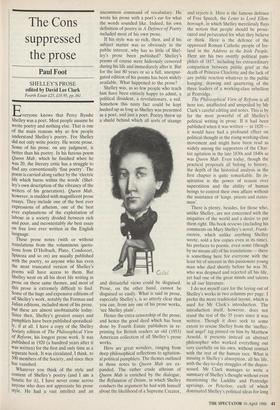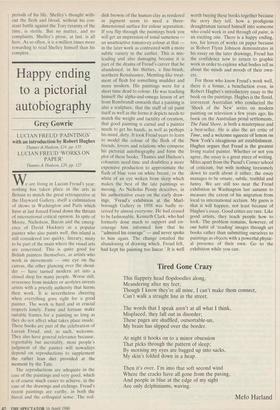The Cons suppressed the prose
Paul Foot
SHELLEY'S PROSE edited by David Lee Clark
Fourth Estate £25, £10.95, pp.361
Everyone knows that Percy Bysshe Shelley was a poet. Most people assume he wrote poetry and nothing else. That is one of the main reasons why so few people understand Shelley's poetry. For Shelley did not only write poetry. He wrote prose. Some of his prose, on any judgment, is better than his poetry. In his furious poem Queen Mab, which he finished when he was 20, the literary critic has a struggle to find any conventionally 'fine poetry'. The poem is carried along rather by the 'electric life which burns within the words' (Shel- ley's own description of the vibrancy of the writers of his generation). Queen Mab, however, is studded with magnificent prose essays. They include one of the best ever expressions of atheism, one of the best ever explanations of the exploitation of labour in a society divided between rich and poor, and incontestably the best essay on free love ever written in the English language.
These prose notes (with or without translations from the voluminous quota- tions from D'Holbach, Plato, Condorcet, Spinoza and so on) are usually published with the poetry, so anyone who has even the most truncated version of Shelley's poems will have access to them. But Shelley went on all his short life writing in prose on these same themes, and most of this prose is extremely difficult to find. Some of the huge and expensive editions of all Shelley's work, notably the Forman and Julian editions, included most of his prose, but these are almost unobtainable today. Since then, Shelley's greatest essays and pamphlets have been published sporadical- ly, if at all. I have a copy of the Shelley Society edition of The Philosophical View of Reform, his longest prose work. It was published in 1920 (a hundred years after it was written) for the first and only time as a separate book. It was circulated, I think, to 500 members of the Society, and since then has vanished.
Whatever you think of the style and content of Shelley's poetry (and I am a fanatic for it), I have never come across anyone who does not appreciate his prose style. He had a vast intellect and an
uncommon command of vocabulary. He wrote his prose with a poet's ear for what the words sounded like. Indeed, his own definition of poetry in A Defence of Poetry included most of his own prose.
If his style was so rich, then, and if his subject matter was so obviously in the public interest, why has so little of Shel- ley's prose been published? Shelley's poems of course were hideously censored during his life and immediately after it. But for the last 80 years or so a full, unexpur- gated edition of his poems has been widely available. What happened to the prose?
Shelley was, as so few people who teach him have been entirely happy to admit, a political dissident, a revolutionary, a red. Somehow this nasty fact could be kept hushed up as long as Shelley was presented as a poet, and just a poet. Poetry threw up a shield behind which all sorts of strange and distasteful views could be disguised. Prose, on the other hand, cannot be disguised so easily. What is said in prose, especially Shelley's, is so utterly clear that you can, from any one of his prose works, `see Shelley plain'.
Hence the extra censorship of the prose; and hence the good deed which has been done by Fourth Estate publishers in re- printing for British readers an old (1953) American collection of all Shelley's prose works.
Here are great wonders, ranging from deep philosophical reflections to agitation- al political pamphlets. The themes outlined in those notes to Queen Mab are ex- panded. The rather crude atheism of Queen Mab is enriched by the dialogue, the Refutation of Deism, in which Shelley conducts the argument he had with himself about the likelihood of a Supreme Creator, and rejects it. Here is the famous defence of Free Speech, the Letter to Lord Ellen- borough, in which Shelley mercilessly flays the notion that people should be prose- cuted and persecuted for what they believe or think. Here is the defence of the oppressed Roman Catholic people of Ire- land in the Address to the Irish People. Here are his two overtly political pam- phlets of 1817, including his extraordinary comparison between public grief at the death of Princess Charlotte and the lack of any public reaction whatever to the public hanging, drawing and quartering of the three leaders of a working-class rebellion at Pentridge.
The Philosophical View of Reform is all here too, unaffected and unspoiled by Mr Clark's careful editing and notes. This is by far the most powerful of all Shelley's political writing in prose. If it had been published when it was written — in 1820 it would have had a profound effect on political thought in the rising working-class movement and might have been read as widely among the supporters of the Char- tist agitation in the late 1830s and 1840s as was Queen Mab. Even today, though the practical proposals all belong to history, the depth of the historical analysis in the first chapter is quite remarkable. Its in- spiration is the power of reason over superstition and the ability of human beings to control their own affairs without the assistance of 'kings, priests and states- men'.
There is plenty, besides, for those who, unlike Shelley, are not concerned with the iniquities of the world and a desire to put them right. His book reviews (including his comments on Mary Shelley's novel, Frank- enstein, which unlike anything Shelley wrote, sold a few copies even in its time), his prefaces to poems, even some (though by no means all) of his translations — there is something here for everyone with the least bit of interest in this passionate young man who died shortly before he was 30, who was despised and rejected all his life, yet had one of the great minds and talents in all our literature.
I do not myself care for the laying out of Shelley's works in two columns per page. I prefer the more traditional layout, which is used for Mr Clark's introduction. The introduction itself, however, does not stand the test of the 35 years since it was written. Though it does seek to some extent to rescue Shelley from the 'ineffec- tual angel' tag pinned on him by Matthew Arnold, it presents instead an abstract philosopher who worked everything out very carefully on his own, without contact with i the rest of the human race. What is missing is Shelley's absorption, all his life, with the day-to-day struggles of the dispos- sessed. Mr Clark manages to write a summary of Shelley's thought without even mentioning the Luddite and Pentridge uprisings, or Peterloo, each of which dominated Shelley's political ideas for long periods of his life. Shelley's thought with- out the flesh and blood, without his con- stant battle against the Tory tyranny of the time, is sterile. But no matter, and no complaints. Shelley's prose, at last, is all here. As so often, it is a million times more rewarding to read Shelley himself than his compere.































































 Previous page
Previous page